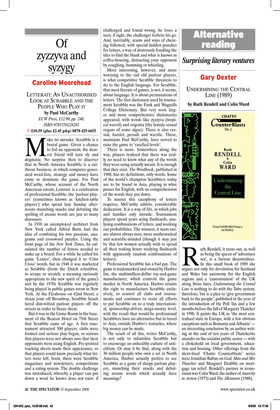Of zyzzyva and syzygy
Caroline Moorehead
LETTERATI: AN UNAUTHORISED LOOK AT SCRABBLE AND THE PEOPLE WHO PLAY IT by Paul McCarthy ECW Press, £12.99, pp. 240, ISBN 9781550228281 ✆ £10.39 (plus £2.45 p&p) 0870 429 6655 Make no mistake: Scrabble is a brutal game. Given a chance to foil an opponent, the dearest friend will turn sly and dogmatic. No surprise then to discover that in North America Scrabble is a cutthroat business, in which computer-generated word-lists, strategy and money have come to dominate the game. For Paul McCarthy, whose account of the North American circuit, Letterati, is a celebration of professional Scrabble, the ‘parlour players’ (sometimes known as ‘kitchen-table players’) who spend lazy Sunday afternoons munching snacks and debating the spelling of arcane words are just so many dinosaurs.
In 1938 an unemployed architect from New York called Alfred Butts had the idea of combining his two passions, anagrams and crossword puzzles. Using the front page of the New York Times, he calculated the number of letters needed to make up a board. For a while he called his game ‘Lexico’, then changed it to ‘Criss Cross’ words, but in 1948 it was marketed as Scrabble (from the Dutch schrabben, to scrape or scratch, a meaning curiously appropriate to the new spirit of the game) and by the 1970s Scrabble was regularly being played in public games room in New York. At the Fleahouse on 42nd Street, a sleazy joint off Broadway, Scrabble fiends lured dim-witted parlour players off the streets in order to fleece them.
But it was in the Game Room in the basement of the Beacon Hotel on 75th Street that Scrabble came of age. A first tournament attracted 500 players, clubs were formed and serious play began, so serious that players were not always sure that their opponents were using English. Pre-printed tracking sheets made their appearance, so that players could know precisely what letters were left. Soon, there were Scrabble magazines and newsletters, competitions and a rating system. The double challenge was introduced, whereby a player can put down a word he knows does not exist: if challenged and found wrong, he loses a turn; if right, the challenger forfeits his go. And, inevitably, scams and ways of cheating followed, with special hidden pouches for letters, a way of dextrously fondling the tiles to find the blank and what is known as coffee-housing, distracting your opponent by coughing, humming or whistling.
More interesting, however, and more worrying to the sad old parlour players, is what competitive Scrabble threatens to do to the English language. For Scrabble, that most literate of games, is not, it seems, about language. It is about permutations of letters. The first dictionary used by tournament Scrabble was the Funk and Wagnalls College Dictionary. But very soon larger and more comprehensive dictionaries appeared, with words like zyzzyva (tropical weevil) and oogonia (the female sexual organs of some algae). There is also crestal, harslet, persalt and warstle. These, maintains Paul McCarthy, have served to raise the game to ‘rarefied levels’.
There is more. Somewhere along the way, players realised that there was really no need to know what any of the words they were using actually meant. It is enough that they exist. The Wordbook, published in 1988, has no definitions, only words. Some of the world’s champion Scrabblers today are to be found in Asia, playing in what passes for English, with no comprehension of the words they put down.
To master this cacophony of letters requires, McCarthy admits, considerable dedication. It is a way of life, in which jobs and families only intrude. Tournament players spend years using flashcards, analysing combinations of letters, and working out probabilities. The winners, it turns out, are almost always men, more mathematical and scientific-minded (though it may just be that few women actually wish to spend all their waking hours studying flashcards with apparently random combinations of letters).
Professional Scrabble has a bad guy. The game is trademarked and owned by Hasbro Inc, the multimillion-dollar toy-and-game manufacturer, which controls the game market in North America. Hasbro retains the right to manufacture Scrabble exclusively, to control all clubs and tournaments and continues to resist all efforts to put Scrabble on to a truly international, sponsorship-driven, mega-money level, with the result that would-be professional Scrabblers have no alternative but to travel to Asia, outside Hasbro’s tentacles, where big money can be made.
The result of all this, writes McCarthy, is not only to infantilise Scrabble but to encourage an unhealthy culture of antielitism. Or may it be that, along with the 30 million people who own a set in North America, Hasbro actually prefers to see Scrabble as a game of sleepy parlour players, munching their snacks and debating arcane words which actually have meanings?










































































 Previous page
Previous page